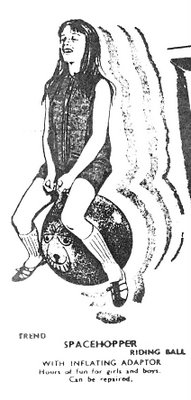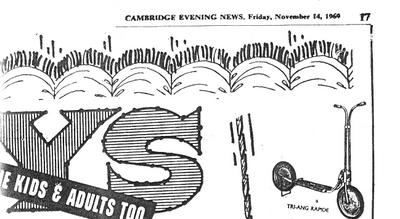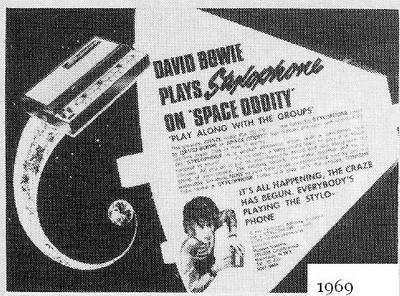Thursday, November 09, 2006
Friends Reunited - More 70s Misinformation...
Here's one I've picked out for you:
"1978: We were playing Space Invaders." We were not. They were just being invented in Japan and would not even be previewed at a UK trade show until 1979! The Invaders were everywhere in the early 1980s.
I don't want to be too hard on Friends Reunited, but shouldn't they try and get things right if they're going to undertake year-by-year rundowns of our leisure activities?
Of course, Pac-Man (1980), the invention of the World Wide Web (1989) and numerous other 80s events were missing from the 1980s section.
More 70s hype!
Saturday, October 07, 2006
The Spacehopper - Released In Britain In The Late 1960s, NOT The 1970s...
 Here is part of a newspaper advertisement showing a girl on a space hopper...
Here is part of a newspaper advertisement showing a girl on a space hopper...... here is the whole advertisement...

... and here is the date - Nov 14th, 1969. For the I Love 1970s series, a small caption was inserted in the opening titles, stating that the space hopper was released in 1968 and then "bounced its way through the 70s". Fair enough, but the I Love... website states that the first spacehoppers arrived in this country in 1971. Would you like onions with your tripe?
The spacehopper was an instant hit, very popular from 1968 onwards. It was still going strong in the '70s, yes, but did it really deserve such major billing? Other sites follow the BBC's line, touting the hopper as either new in 1971 or as THE craze of 1971. Popular, yes. New or a sudden craze? Most certainly not.
A willing victim of the BBC's misinformation is the Toy Retailers Association, formerly the British Association of Toy Retailers. Their website informs us that the Space Hopper arrived in 1971 and was "Craze of the Year". But unfortunately, the Association NEVER had a "Craze of the Year" award, and media of 1971 reveals that the Hopper was certainly not newsworthy.
Oddly enough, in the late 1990s, the Toy Retailers Association were listing: "Clackers, otherwise known as Klik Klaks" as the "overwhelming toy mania of 1971".
That information is accurate. So, why hype the spacehopper out of the 1960s and into the 1970s now?
I believe this muddling of facts is due to the BBC having an agenda to hype the 70s in the I love 1970s series.
There is also the fact that people who were children in the 1970s are often pulling the strings now, and the Internet provides a tremendous opportunity for the spreading of untruths and building up or knocking down of various eras. When you consider that the World Wide Web was only invented in 1989, and Internet use has blossomed incredibly since then, you can see the difficulties. Anybody can publish anything on the Web - and, as well as great sites, there are many which tell untruths for their own ends.
Many people invest much time in hyping the 70s - those who want to feel good about their youth, and those young geeks and nerds who do not remember the 70s, but have no present and enjoy "living" in a nice, safe fantasy past.
It is sad and silly.
But the spacehopper did not arrive in this country in 1971, or indeed in the 1970s at all.
And that's a fact.
Friday, August 18, 2006
BBC On This Day - Brighton Nudist Beach, 1980 - NOT 1979
My sister-in-law Deborah has been in touch to tell me of a sorry tale involving Brighton Nudist Beach, and Alison Trowsdale and Hanna White, two BBC employees committed to the old maxim "the customer is always wrong".
Deborah is a researcher who specialises in recent pop culture, and was surprised to read on the BBC's "On This Day" site: "August 1979 - Brighton Bares All". There followed an article about Brighton nudist beach, which opened in April 1980. The article referred to a decision made in 1979 to give the beach the go-ahead, but the "Brighton Bares All" title rather suggested that the beach opened in '79 and the only reference to the 1980 opening date was tucked away under a heading entitled "In Context". Odd.
Some months later, Deborah bought a birthday card for a young relative, born in 1979. It featured so-called events of 1979 - a "Year You Were Born" theme card - and announced: "Britain's first nudist beach opened in Brighton". Intrigued, Deborah phoned the manufacturers.
"But it must be true!" she was told: "The BBC says so - August 1979, on this day, 'Brighton Bares All'!" Further investigation proved that the BBC's On This Day article had led quite a lot of others up the garden path. Surely it made more sense to commemorate the anniversary of the beach's opening day - 1st April 1980?
But the BBC doesn't like the 1980s. Bizarrely, a BBC Oxford online article, this time about the World Wide Web, touts 1990 as the pivotal year - and the trivial fact that the web was invented in 1989 is tucked away in the small print!
Anyway Deborah wrote to the BBC about the Brighton nudist beach...
Ridiculous article - it gives the impression that the beach opened in August 1979. There was no nudity on that beach until the opening day in 1980. The BBC really needs to get over its 70s fixation.
And BBC employee Alison Trowsdale replied:
The report "Brighton bares all" was written to coincide with the date the local authority made the decision to designate part of Brighton beach for nudists. It clearly states that the beach officially opened 1 April 1980.
"Officially" opened? Actually, the beach "opened" on 1 April 1980. Deborah wrote again, reasoning:
The Brighton nudists' beach article is headed "August 1979 - Brighton Bares All" and only states some way in that the beach officially opened on 1st April 1980. It did not OFFICIALLY open on 1st April 1980, it OPENED on 1st April 1980 - I was there.
The article is, I'm afraid, misleading and has led to inaccurate information appearing on several websites and a range of "Year You Were Born" greetings cards - all stating that the beach opened in 1979. I have made enquiries, and the BBC has been cited as the source of information on each and every occasion.
Brighton and Hove Council's article on the beach does not even mention 1979...
"On This Day" for 1st April contains no mention of the beach's big opening in 1980.
I do wish that you would not reject my complaint out of hand. The BBC is supposed to serve, not press its bizarre 1970s obsessed view of the past on to the general public. We had quite enough of the warped view with the "I Love 1970s" TV series.
No answer came the stern reply. Deborah wrote again and received this reply from one Hanna White:
Your latest email to On This Day is not being ignored at all. Alison Trowsdale works part-time for the BBC and is not currently at work.
Her initial response to you was not dismissive but sought to point out that all the facts of the story were there to be read.
However we have decided to changed one word in the first paragraph of the article from "has" to "will" for greater clarification.
Regards
Hanna White
Finally Deborah decided to make a formal complaint.
This was a trivial matter. Deborah had evidence that the article had led to confusion. But the BBC dug its heels in and conceded only to the point of making a grudging, tiny, alteration to the article. The article is still open to misinterpretation. Web surfers are notorious for skimming - we do it ourselves!
BBC information should be clear. The article should be dated 1 April 1980, beginning with the tale of the beach's opening day, and then telling the background story.
Deborah has recently suffered two bereavements, and has handed over the reins to myself and the 80s Actual group. We think it is best to publicise the BBC's attitude - and, although this is a trivial incident, we think it is important. It indicates the BBC's attitude to the public, and also its ridiculous attempts to glorify the 1970s.
We shall be monitoring!
Friday, July 28, 2006
The Shake n Vac TV Ad - 1980s NOT 1979
 I have an extensive collection of newspapers, and access to an archive dating back to the nineteenth century. The first reference to Shake n' Vac I've found dates to 1982, when it was a free gift with the new Hoover High Power Junior vacuum cleaner. I am absolutely convinced that the Shake n' Vac ad is later than 1979, and finds like this do nothing to sway my conviction.
I have an extensive collection of newspapers, and access to an archive dating back to the nineteenth century. The first reference to Shake n' Vac I've found dates to 1982, when it was a free gift with the new Hoover High Power Junior vacuum cleaner. I am absolutely convinced that the Shake n' Vac ad is later than 1979, and finds like this do nothing to sway my conviction.1979 is terribly successful - already cropping up an awful lot where it shouldn't, eating up 1980s pop culture faster than Pac-Man ever could. Let's take an example. In the early-to-mid 1980s, there came into being a terrible television advertisement for a product called Shake n Vac carpet freshener. Lord knows when the product itself was launched, the earliest newspaper advertisements I can find date to 1982 when a packet was being given away free with each new Hoover Junior vacuum cleaner purchased.
Free giveaways such as this were a popular gambit with NEW PRODUCTS.
I'm not saying that the Shake n' Vac ad began in 1982 - I suspect it was a little later. I'm not even suggesting that Shake n' Vac itself was launched in 1982. All I am saying is that the famous TV ad was definitely later than 1979.
In the ad, a woman called Jenny Logan, playing a highly intelligent housewife, sang a retro rock n roll (1950s) style jingle, and did a '50s dance, whilst de-ponging her carpet. In the Year 2000, this advertisement was arousing nostalgic twinges. But it began in the early-to-mid-1980s! Oh dear, that will never do - call it "1979"! Yes, that's it! So, in a Channel Four programme called 100 Greatest British TV Ads, the advert, which came 19th, was listed as "1979". It worked a treat.
The Internet buzzed as young 1970s fantasists marvelled at this newly discovered item of "70s" pop culture. Andrew Collins, who was born in 1965 and perhaps should know better, edited the Friends Reunited book, and, it seemed, simply couldn't wait to list Shake n Vac as a "1970s Television advertisement". I'm not sure how Jenny Logan, the ad's star, viewed all this, but nobody else gave a damn so another piece of non-1970s pop culture was added to that decade by 1970s hype-ists. You can still view the ad on the internet today, marked "1979", together with a companion ad from 1988, implying that the campaign ran, on-and-off, for at least nine years. It didn't. We couldn't have stood it.
It all left me pondering over Box Of Delights - a book by TV writer Hilary Kingsley, published in 1989, which states that the Shake n Vac ad began in 1985. Each telly year covered in the book (from the birth of ITV in 1955 to the book's publication year, 1989) contains a "Commercial Break" section, and I quote from 1985:
... an inane housewife cavorted around the lounge doing the Shake 'n' Vac. Was that what Emmeline Pankhurst fought for?
Actually, I hadn't long moved house when the ad campaign started and that move took place around 1982/83.
So another sucessful coup for the 1970s hypers. And not a mention of power cuts, the Winter of Discontent, the 1979 playground shootings (which led to the Boomtown Rats' chilling hit I Don't Like Mondays) or the 1979 ITV strike, which knocked the channel off the air for 11 weeks. In fact not a mention of anything that was, in reality, 1970s. It's all terribly simple...
Shake n' Vac: A New Product Launch
Launch of a new powder carpet and room freshener. Sold in 1979, but advertising delayed to 1980 by ITV strike. TV only used. Results: consistent sales growth (Nielsen Food Index); sales growth linked to advertising; awareness, brand recall, levels of trial, all satisfactory. Regional variations on ad weight relate positively to sales and share (Nielsen). Contribution to profit and overheads in first year claimed, though not substantiated.
Thursday, July 27, 2006
Wikipedia - Inaccurate 1970's Information
I fear that 1970s revivalist geeks and nerds are rewriting the decade for Wikipedia, just like the researchers for the BBC's I Love 1970s and channel 5's That Was The Decade That Was series did for television in Britain.
Suddenly, the 1960s, a genuine era of rapid change, are unimportant.
Whilst stating that events are often wrongly attributed to the 1960s, Wikipedia then goes and does exactly the same thing with the 1970s. I certainly don't remember the feminist thing being the "be all and end all" of the 70s. It began in the 1960s (indeed media from that era suggests that it was very well advanced before the end of the decade), and was just as prevalent in the 1980s as in the 70s.
Gay rights? True, there were developments there in the 1970s, but the intial impetus came from the 1960s (homosexual acts between consenting adults in private were legalised in England and Wales in 1967) and the developments continued into the 80s and 90s and, indeed, beyond. The impact of AIDS, once touted as a "gay plague", had a huge impact on gay rights campaigns.
According to Wikipedia, everything of import happened in the 1970s.
The UK TV section refers to "innocent" 70s sitcoms. I remember an awful lot of smut. Isn't rosy coloured emotionalism clouding objectivity?
The Wikipedia 1970s section is HUGE, compared to its miniscule 1960s section. How this can be justified, I really cannot begin to imagine.
But then I do not understand the idea behind an online encyclopedia where anybody can write anything anyway.
The "let's glorify the 70s" ethos spills over into Wiki's accounts of adjacent decades and other sections, giving a unique and totally inaccurate account of the importance of the 1970s as a 20th Century decade. What is written is very similar to the (perhaps sometimes rather over-the-top) accounts of the glories of the 1960s in the media of the 1970s and 1980s.
Except that the 1960s were genuinely worthy of note.
There is something extremely amateurish about the 70s hype allowed on Wikipedia. One can smell the reasoning behind a lot of the waffle...
I write good things about the 1970s because it was my youthful era and my generation are special!
I write good things about the 1970s because I'm a nerd with no life in the current day.
If Wiki's 1970s information is anything to go by, then I certainly wouldn't use the site for research purposes. It is simply not of a standard professional enough to be trustworthy.
In fact I can only recommend that serious researchers avoid Wikipedia - or take the whole thing with a large pinch of salt.
Friday, April 07, 2006
1969? Call it 1970!
Thursday, April 06, 2006
EBay Buyers - Beware Of 70s hype!
Watch yourself if buying "70s" items on eBay. It isn't just "70s" technology such as phones etc that are far more likely to be 1980s. Even some licensed TV and advertising characters often crop up as "70s".
Recently I spotted a badge from a well known TV advertising campaign, featuring a character invented in 1982, but listed as "70s".
Be warned...
And sellers - if you do not know when an item was produced, without any doubt, do not pretend that you do.

